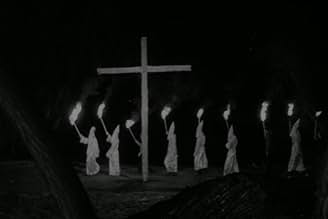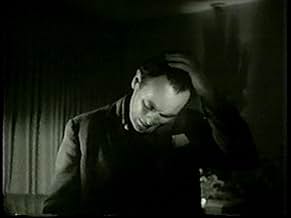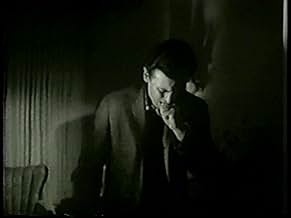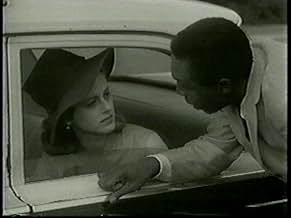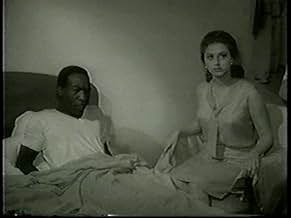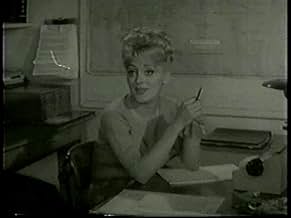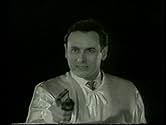Ajouter une intrigue dans votre langueAfter a black man's daughter is killed by the KKK, he seeks revenge by becoming a Klansman.After a black man's daughter is killed by the KKK, he seeks revenge by becoming a Klansman.After a black man's daughter is killed by the KKK, he seeks revenge by becoming a Klansman.
- Réalisation
- Scénario
- Casting principal
James McEachin
- Lonnie
- (as Jimmy Mack)
W. McLennard
- Wallace
- (as William McLennard)
R.L. Armstrong
- Jenkins
- (as Tex Armstrong)
Avis à la une
If ever there was a time and place to utilize the word 'hoot' in reference to a film, the 'Black Klansman' is transcendental material. How is this piece of art not on DVD as of the year 2004? With mighty waving banner of fierce and vengeful fire, the front man of this film undercuts the enslaving white man by going undercover and tearing down the metaphorical burning cross. In a way, this film is to American HISTORY X as SUBURBIA is to SLC PUNK. This is 1966 exploitation baby, and if you've ever heard the 'N' word, you've still never heard it like this! Shocking today even though no one has seen it. Beg, borrow, steal and investigate getting hold of this film directed by the people who brought you film about zombies and machines that grind up women in bikinis. 4 stars.
Though I never heard of any of the actors except the excellent James McEachin, nearly every single player gives a good to excellent performance.
It starts rather badly, and my thoughts were negative about the director, Ted V. Mikels, whose work is apparently mostly exploitative, and the nominal lead, Richard Gilden. But after a few more scenes, everything shifts into a higher gear and actors and director present us with a good movie.
At this writing, March of 2019, the film is 53 years old. Most of the worst aspects of the problem presented by the story have receded. While Ku Klux Klan and similar organizations still exist, they are generally discounted by most of the rest of the population.
Except: the U.S. "news" media and other Democrats and other left-collectivists would have us believe that every problem in these United States derives from "racism" and that most people, especially those who don't buy into the left-collectivist belief system, are "racists."
In addition, among the left-collectivists, including the "news" media, there is a sickening and disgusting emphasis placed on group identity, which is, in fact, what is wrong with such groups as the KKK, but is somehow accepted when it's from Democrat candidates.
In fact, each of us is an individual, no matter what our skin color. And one point made in this film is that the protagonist, with one black parent, looks white enough to be allowed membership in the Klan.
Not stressed in this movie is the notion that one's skin color or ethnicity cannot lead to any particular belief system. But it's a fact.
Yes, one's culture, one's neighbors, one's schooling can certainly bend a person's thinking, but not that person's skin color, not race or ethnicity.
The premise of this mostly very well-done motion picture is excellent, it's timely, even after the decades since its premiere. The acting is first class, its picture of the rituals of the KKK certainly look real, almost, in spots, like a documentary.
I highly recommend this movie, under whichever title, even if the ending is a bit ambiguous. Very, very well done.
It starts rather badly, and my thoughts were negative about the director, Ted V. Mikels, whose work is apparently mostly exploitative, and the nominal lead, Richard Gilden. But after a few more scenes, everything shifts into a higher gear and actors and director present us with a good movie.
At this writing, March of 2019, the film is 53 years old. Most of the worst aspects of the problem presented by the story have receded. While Ku Klux Klan and similar organizations still exist, they are generally discounted by most of the rest of the population.
Except: the U.S. "news" media and other Democrats and other left-collectivists would have us believe that every problem in these United States derives from "racism" and that most people, especially those who don't buy into the left-collectivist belief system, are "racists."
In addition, among the left-collectivists, including the "news" media, there is a sickening and disgusting emphasis placed on group identity, which is, in fact, what is wrong with such groups as the KKK, but is somehow accepted when it's from Democrat candidates.
In fact, each of us is an individual, no matter what our skin color. And one point made in this film is that the protagonist, with one black parent, looks white enough to be allowed membership in the Klan.
Not stressed in this movie is the notion that one's skin color or ethnicity cannot lead to any particular belief system. But it's a fact.
Yes, one's culture, one's neighbors, one's schooling can certainly bend a person's thinking, but not that person's skin color, not race or ethnicity.
The premise of this mostly very well-done motion picture is excellent, it's timely, even after the decades since its premiere. The acting is first class, its picture of the rituals of the KKK certainly look real, almost, in spots, like a documentary.
I highly recommend this movie, under whichever title, even if the ending is a bit ambiguous. Very, very well done.
This film begins in Los Angeles with a black jazz musician by the name of "Jerry Ellsworth" (Richard Gilden) learning that his young daughter has just been killed by members of a racist organization in the small town of Turnerville, Alabama. Seeking revenge upon the people that committed this act, he immediately boards a flight to Turnerville where he hopes his light-skinned complexion will allow him to masquerade as a white man long enough for him to infiltrate the local chapter of the KKK. What he doesn't know, however, is that his white girlfriend "Andrea" (Rima Kutner) and his good friend "Lonnie" (James McEachin) have followed right behind him and their appearance creates unforeseen difficulties which endangers his extremely hazardous plan. Now, rather than reveal any more, I will just say that this was a fairly interesting film which was hindered somewhat by the rather low-budget production values and mediocre acting of all concerned. It does, however, serve as a decent precursor to the blaxploitation films which followed a few years later and for that reason I have rated this film accordingly. Average.
The legendary schlock director, creator of such memorable productions as "Astro-Zombies" and "The Doll Squad", actually takes himself seriously for this reasonably effective, interesting comment on race relations in the deep South, circa 1966. This is a time when a civil rights law had been passed, and the white people in this story are none too happy about that. Some of the Klansmen in the small Alabama town of Turnerville try to fire bomb a church and kill the daughter of a man named Jerry Ellsworth (Richard Gilden). Jerry, you see, is a light skinned black who realizes that he could pass for white, so he does so and manages to infiltrate the KKK so that he can get his revenge.
One might have a hard time believing that this is the same Mikels who made those other pictures. It works pretty well, and one can get caught up in the story, written by John T. Wilson and Art Names, and be eager to see the antagonists get their just desserts. This is all done in a very straightforward, no frills manner, and it does get a lot of juice from a standout characterization by Max Julien, later star of "The Mack", as a young revolutionary with a "by any means necessary" type of approach. His scenes are the best in the movie. But star Gilden ('Death Valley Days') does a decent job as well. Harry Lovejoy as Rook is good at playing just the sort of guy who deserves his comeuppance. James McEachin (star of the short-lived 'Tenafly' TV series) makes a strong film debut as Lonnie. Look for Byrd Holland, also the makeup artist on this show, in a small role as the mayor, and B movie legend Gary Kent as Wilkins.
Sharp cinematography by Robert Caramico and atmospheric music by Jaime Mendoza-Nava are solid attributes, and the movie comes complete with a theme song that's a real hoot.
I agree with another review here: it would be too easy to dismiss this as mere exploitation; it does have more depth than some people would expect. It's worth a look.
Eight out of 10.
One might have a hard time believing that this is the same Mikels who made those other pictures. It works pretty well, and one can get caught up in the story, written by John T. Wilson and Art Names, and be eager to see the antagonists get their just desserts. This is all done in a very straightforward, no frills manner, and it does get a lot of juice from a standout characterization by Max Julien, later star of "The Mack", as a young revolutionary with a "by any means necessary" type of approach. His scenes are the best in the movie. But star Gilden ('Death Valley Days') does a decent job as well. Harry Lovejoy as Rook is good at playing just the sort of guy who deserves his comeuppance. James McEachin (star of the short-lived 'Tenafly' TV series) makes a strong film debut as Lonnie. Look for Byrd Holland, also the makeup artist on this show, in a small role as the mayor, and B movie legend Gary Kent as Wilkins.
Sharp cinematography by Robert Caramico and atmospheric music by Jaime Mendoza-Nava are solid attributes, and the movie comes complete with a theme song that's a real hoot.
I agree with another review here: it would be too easy to dismiss this as mere exploitation; it does have more depth than some people would expect. It's worth a look.
Eight out of 10.
After a black man's daughter is killed by the KKK, he seeks revenge by becoming a Klansman.
This film can be dismissed as an exploitation film, and maybe it should be, but I personally thought it was a strong social commentary on color and race in America. Definitely during the 1960s, but probably even to some degree today (2013).
The real honor of this film has to go to the actor who played Jerry, because he had to balance between looking black and looking white and making this believable. He succeeded. I actually do not know if he was completely white or if he was lighter-skinned and black. I could look it up, but I think that his character makes the point -- it does not matter. If he can be treated as either, then race should not matter.
This film can be dismissed as an exploitation film, and maybe it should be, but I personally thought it was a strong social commentary on color and race in America. Definitely during the 1960s, but probably even to some degree today (2013).
The real honor of this film has to go to the actor who played Jerry, because he had to balance between looking black and looking white and making this believable. He succeeded. I actually do not know if he was completely white or if he was lighter-skinned and black. I could look it up, but I think that his character makes the point -- it does not matter. If he can be treated as either, then race should not matter.
Le saviez-vous
- AnecdotesMax Julien (Raymond) and Whitman Mayo (Alex) are both members of Kappa Alpha Psi Fraternity Inc.
- ConnexionsFeatured in The Wild World of Ted V. Mikels (2008)
- Bandes originalesThe Black Klansman
By Tony Harris
Meilleurs choix
Connectez-vous pour évaluer et suivre la liste de favoris afin de recevoir des recommandations personnalisées
- How long is The Black Klansman?Alimenté par Alexa
Détails
Box-office
- Budget
- 80 000 $US (estimé)
- Durée1 heure 28 minutes
- Couleur
- Mixage
- Rapport de forme
- 1.85 : 1
Contribuer à cette page
Suggérer une modification ou ajouter du contenu manquant

Lacune principale
By what name was The Black Klansman (1966) officially released in India in English?
Répondre
